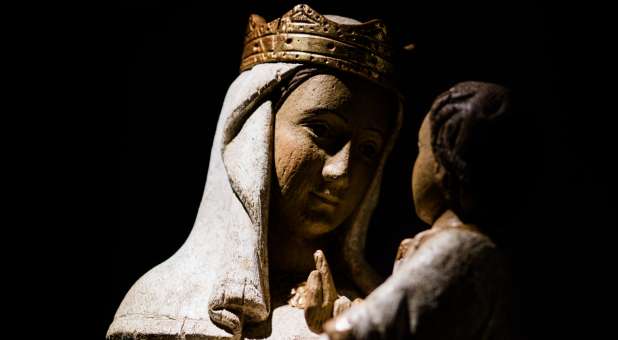Bible Verse of the Day, Dec. 19th: Advent Season, Luke 1:46-56
Luke 1:46-56
The Song of Mary
And Mary said:
“My soul magnifies the Lord,
and my spirit rejoices in God my Savior.
For He has regarded
the low estate of His servant;
surely, from now on all generations will call me blessed.
For He who is mighty has done great things for me,
and holy is His name.
His mercy is on those who fear Him
from generation to generation.
He has shown strength with His arm;
He has scattered the proud in the imagination of their hearts.
He has pulled down the mighty from their thrones
and exalted those of low degree.
He has filled the hungry with good things,
and the rich He has sent away empty.
He has helped His servant Israel,
in remembrance of His mercy,
as He spoke to our fathers,
to Abraham and to his descendants forever.”
Mary remained with her about three months and returned to her own house.
Mary
Overcome the Urgency of the Natural to Seek the Priority of the Spiritual
Lazarus and his sisters, Mary and Martha, were very good friends of Jesus. Their home in Bethany seemed to be a place of rest for Him as He journeyed to Jerusalem. He would go there, eat, relax, and share the intimate thoughts of His Father’s heart. We see this in Luke 10, when Martha gets upset because dinner has been served and the dishes need to be cleaned, yet Mary sits and listens to what Jesus has to say (vv. 38–42).
You can even see from this story that Martha perceives the end of dinner differently than Mary. Martha perceives the end as a mess that is calling for a new order; Mary sees the end as an opportunity to glean a new type of food that could affect her future. Martha gets distracted at the end of dinner. Mary eats a greater meal, the word of the Lord Himself, who sits in their midst. Martha receives a rebuke at the end of dinner; Mary receives a commendation for her faith. Both receive the Lord’s love, but only one receives His heart and the revelation for the future.
Mary had learned to overcome the urgency of what she was expected to do in the natural and to seek to follow the priority of the spiritual—a deeper, more intimate relationship with Jesus and to receive what He had to teach her.
When Jesus arrived in Bethany after the death of Lazarus, Martha stood to question the Lord about why He was not there when they needed Him. The Lord told her, “Did I not tell you that if you believed, you would see the glory of God?” (John 11:40, emphasis added). The crisis had escalated. The disease had won. Lazarus was dead. Martha was quick to affirm her faith in the future but was perplexed in the moment. Jesus finally asked for her sister, Mary, to come and visit with Him.
Mary then approached the Lord with the very same question. Why? But something was different about Mary. Her posture was different. Martha stood, but Mary exhibited a different attitude at the end of this terrible situation by falling at His feet as a sign of respect, honor, and submission! In other words, Mary said, “Lord, I will submit to whatever You say and whatever explanation You give. I have sat at Your feet before and received the best You had to give. I will wait here now to receive what You have to give, which will be the best, in the midst of this crisis.”
Mary’s appeal to the Lord touched the core of His emotions—the very heart of Father God. This caused Jesus to express a public emotion seldom written about in the Scriptures; He groaned deeply. He wept. He released a great compassion in the crisis. Then He exercised an authority that changed and shaped the history of all mankind. He revealed His glory and resurrection power in a way that history and mankind had not known. He called Lazarus from the grave to give him a second opportunity at life. {eoa}






































